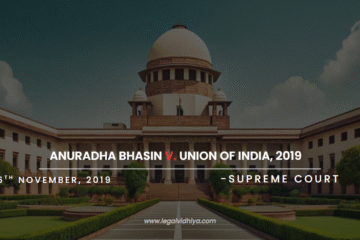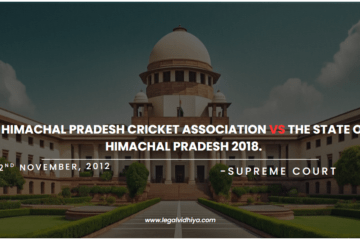
| CITATION | (2018) 17 SCC 627 |
| DATE OF JUDGEMENT | 16 August, 2018 |
| COURT | Supreme Court of India |
| APPELLANT | Mohan Lal |
| RESPONDENT | State of Punjab |
| BENCH | Navin Sinha, R. Banumathi, Ranjan Gogoi |
INTRODUCTION
The case of Mohan Lal v. State of Punjab (2018), is a significant ruling by the Supreme Court of India that addresses the principles of fair investigation and trial under the Narcotic Drugs and Psychotropic Substances (NDPS) Act, 1985. The case revolves around the procedural integrity of investigations where the same police officer acts both as the complainant and the investigating officer, raising concerns about potential bias and fairness. The year 2018 signifies the year in which the case was heard or decided by the Supreme court.
FACT OF THE CASE:
That, in the case, Sub-Inspector Chand Singh of Balianwali Police Station was on patrol duty, accompanied by Darshan Singh (the Sarpanch) and Assistant Sub-Inspector Balwinder Singh. During their patrol, they encountered the appellant, Mohan Lal, which raised reasonable suspicion.
That, following the suspicion, IPS officer Shri Rajinder N. Dhoke, a gazetted officer, called Mohan Lal and conducted a search. This search led to the discovery of 4 kg of opium in a bag carried by the appellant.
That, a consent memo was signed by Darshan Singh (a private person in a police vehicle) and Sub-Inspector Chand Singh following the recovery of the opium. The seized opium was then divided into two samples: one weighing 20 grams and the other weighing 3 kg and 980 grams.
That, Sub-Inspector Chand Singh prepared a specimen of the seal, attached it, and handed over the seized material to ASI Balwinder Singh. Chand Singh subsequently prepared a recovery memo and sent it to Balianwali Police Station.
That, Assistant Sub-Inspector Darshan Singh formally registered the FIR based on the recovery memo. The entire investigation was then handed over to Sub-Inspector Chand Singh.
That, SI Chand Singh, who was involved in the initial patrol and search, also took charge of the subsequent investigation. This raised concerns about the fairness and impartiality of the investigation.
That, Mohan Lal was convicted under the NDPS Act based on the evidence gathered during this investigation. He appealed the conviction, arguing that the investigation was biased because the same officer conducted both the search and the investigation.
ISSUE RAISED:
Whether in a criminal prosecution it will be in consonance with the principles of justice, fair play and fair investigation if the informant and investigating officer were to be same person?
CONTENTIONS OF THE APPELLANT:
The appellant argued that the investigation was biased because the same officer who conducted the search and seizure (Sub-Inspector Chand Singh) also took charge of the subsequent investigation.
This dual role of the investigating officer compromised the impartiality of the investigation, thereby violating the principles of a fair trial.
It was contended that the involvement of the same officer in both the search and investigation stages created a conflict of interest, leading to a prejudiced investigation and trial.
The appellant emphasized that this compromised his right to a fair trial under Article 21 of the Indian Constitution.
The appellant highlighted procedural lapses and argued that proper protocols were not followed during the search, seizure, and investigation.
The improper handling of the case by the same officer was cited as a significant procedural flaw.
CONTENTIONS OF THE RESPONDENT:
The respondent argued that all legal procedures and protocols were duly followed during the search, seizure, and investigation.
The involvement of Sub-Inspector Chand Singh in both the search and investigation was justified and did not affect the fairness of the investigation.
The respondent emphasized that the evidence against Mohan Lal, including the recovery of 4 kg of opium, was substantial and justified the conviction under the NDPS Act.
The consent memo signed by witnesses and the proper sealing of the seized material were cited as proof of a legitimate and unbiased investigation.
The respondent contended that the dual role of Sub-Inspector Chand Singh did not result in any conflict of interest.
It was argued that the officer’s actions were in line with his duties and did not compromise the investigation’s integrity.
JUDGEMENT:
The Supreme Court of India delivered a significant judgment on, 16 August, 2018, in the case of Mohan Lal v. State of Punjab, addressing critical issues concerning the impartiality and fairness of criminal investigations under the Narcotic Drugs and Psychotropic Substances (NDPS) Act, 1985.The Court held that the same officer acting as both the complainant and the investigating officer in a criminal case violates the principles of a fair trial. This dual role creates a reasonable apprehension of bias and conflict of interest, which is detrimental to the integrity of the investigation and the accused’s right to a fair trial under Article 21 of the Indian Constitution.
The judgment emphasized the necessity for a clear separation between the roles of the complainant and the investigating officer. The Supreme Court underscored that the investigation should be conducted by an independent officer who is not involved in the initial stages of the case to ensure objectivity and impartiality. The Court set aside the conviction of Mohan Lal under the NDPS Act, acknowledging that the investigation was vitiated due to the involvement of the same officer in both the search and investigation processes. The procedural impropriety compromised the fairness of the trial. The Supreme Court ordered a retrial to be conducted by an independent officer, free from the influence of any previous procedural flaws. The retrial aims to uphold the principles of justice and ensure that the investigation and trial are conducted impartially.
CONCLUSION:
The judgment in Mohan Lal v. State of Punjab (2018) 17 SCC 627 is a landmark decision that reinforces the importance of maintaining the integrity and impartiality of criminal investigations. By mandating the separation of roles between the complainant and the investigating officer, the Supreme Court has set a crucial precedent to prevent any potential bias and ensure fair trials in the Indian criminal justice system.
REFERENCE:
- https://indiankanoon.org
- https://www.lawyersclubindia.com/judiciary/mohan-lal-v-state-of-punjab-2018-acquittal-of-accused-when-complainant-and-i-o-are-same-4977.asp
This Article is written by Akansha Koshta student of Hari Singh Ruprah Art’s, Commerce & Law College, Jabalpur; Intern at Legal Vidhiya.
Disclaimer: The materials provided herein are intended solely for informational purposes. Accessing or using the site or the materials does not establish an attorney-client relationship. The information presented on this site is not to be construed as legal or professional advice, and it should not be relied upon for such purposes or used as a substitute for advice from a licensed attorney in your state. Additionally, the viewpoint presented by the author is of a personal nature.




0 Comments